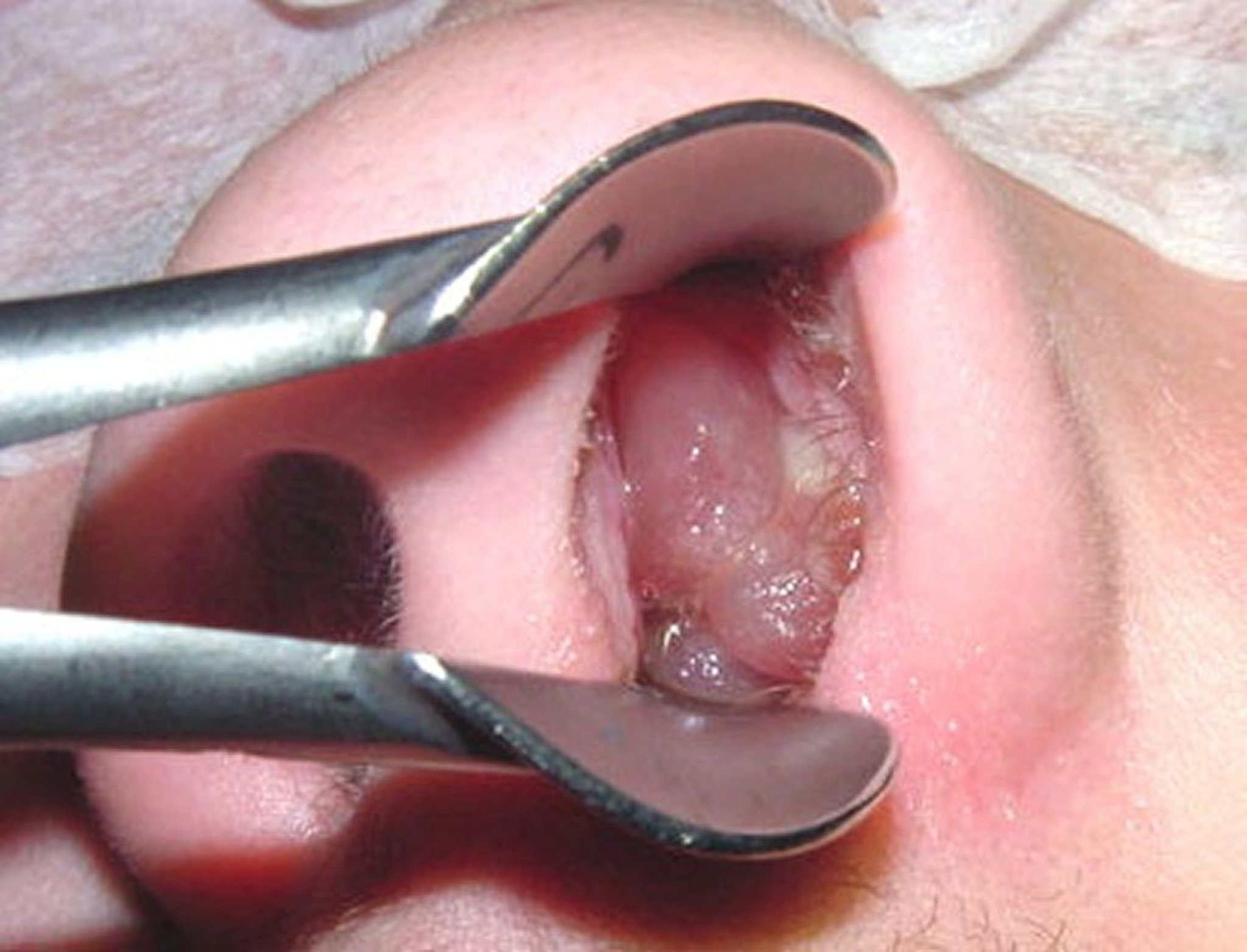Nasal polyps are fleshy outgrowths of the nasal mucosa that form at the site of dependent edema in the lamina propria of the mucous membrane, usually around the ostia of the maxillary sinuses.
Topic Resources
Allergic rhinitis, acute and chronic infections, and cystic fibrosis all predispose to the formation of nasal polyps. Bleeding polyps occur in rhinosporidiosis. Unilateral polyps occasionally occur in association with or represent benign or malignant tumors of the nose or paranasal sinuses. They can also occur in response to a foreign body. Nasal polyps are strongly associated with
Aspirin allergyAspirin allergy
Symptoms include obstruction and postnasal drainage, congestion, sneezing, rhinorrhea, anosmia, hyposmia, facial pain, and ocular itching.
Diagnosis generally is based on physical examination. A developing polyp is teardrop-shaped; when mature, it resembles a peeled seedless grape.
Image provided by Bechara Ghorayeb, MD.
Treatment of Nasal Polyps
Topical corticosteroid spray
Sometimes surgical removal
Corticosteroids (eg, mometasone [30 mcg/spray], beclomethasone [42 mcg/spray], flunisolide [25 mcg/spray] aerosols), given as 1 or 2 sprays twice a day in each nasal cavity, may shrink or eliminate polyps, as may a 1-week tapered course of oral corticosteroids. In patients with severe chronic rhinosinusitis with nasal polyps, biologics (eg, dupilumab) have been effective by shrinking the polyps and improving symptoms (Corticosteroids (eg, mometasone [30 mcg/spray], beclomethasone [42 mcg/spray], flunisolide [25 mcg/spray] aerosols), given as 1 or 2 sprays twice a day in each nasal cavity, may shrink or eliminate polyps, as may a 1-week tapered course of oral corticosteroids. In patients with severe chronic rhinosinusitis with nasal polyps, biologics (eg, dupilumab) have been effective by shrinking the polyps and improving symptoms (1).
Surgical removal of nasal polyps is required in many cases. Polyps that obstruct the airway or promote sinusitis are removed, as are unilateral polyps that may be obscuring benign or malignant tumors.
Polyps tend to recur unless the underlying allergy or infection is controlled. After removal of nasal polyps, topical beclomethasone or flunisolide therapy tends to retard recurrence. In severe recurrent cases, maxillary sinusotomy or ethmoidectomy may be indicated. These procedures are usually done endoscopically.Polyps tend to recur unless the underlying allergy or infection is controlled. After removal of nasal polyps, topical beclomethasone or flunisolide therapy tends to retard recurrence. In severe recurrent cases, maxillary sinusotomy or ethmoidectomy may be indicated. These procedures are usually done endoscopically.
Treatment reference
1. Bachert C, Han JK, Desrosiers M, et al: Efficacy and safety of dupilumab in patients with severe chronic rhinosinusitis with nasal polyps (LIBERTY NP SINUS-24 and LIBERTY NP SINUS-52): results from two multicentre, randomised, double-blind, placebo-controlled, parallel-group phase 3 trials [published correction appears in Lancet 394(10209):1618, 2019]. Lancet 394(10209):1638–1650, 2019. doi:10.1016/S0140-6736(19)31881-1

